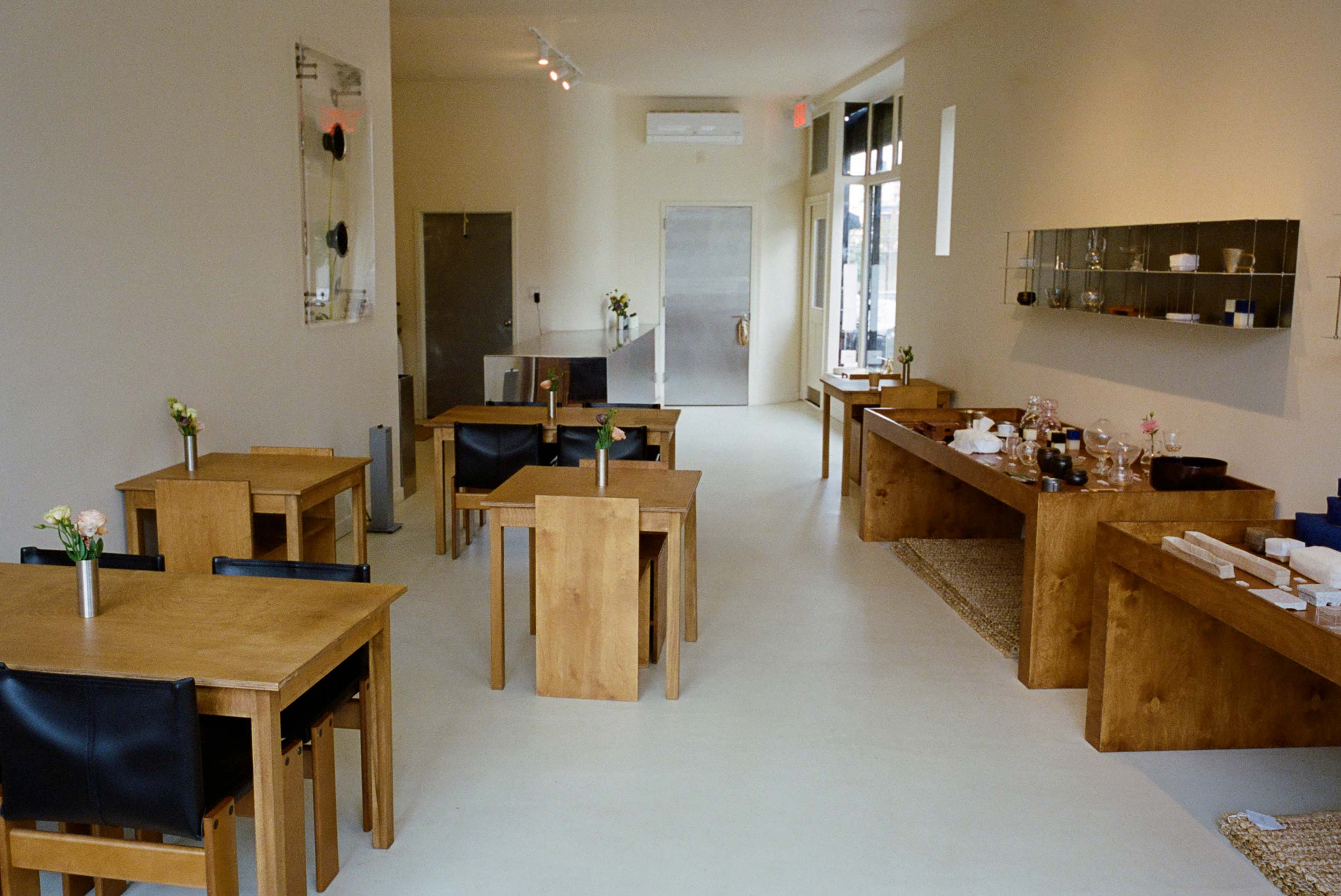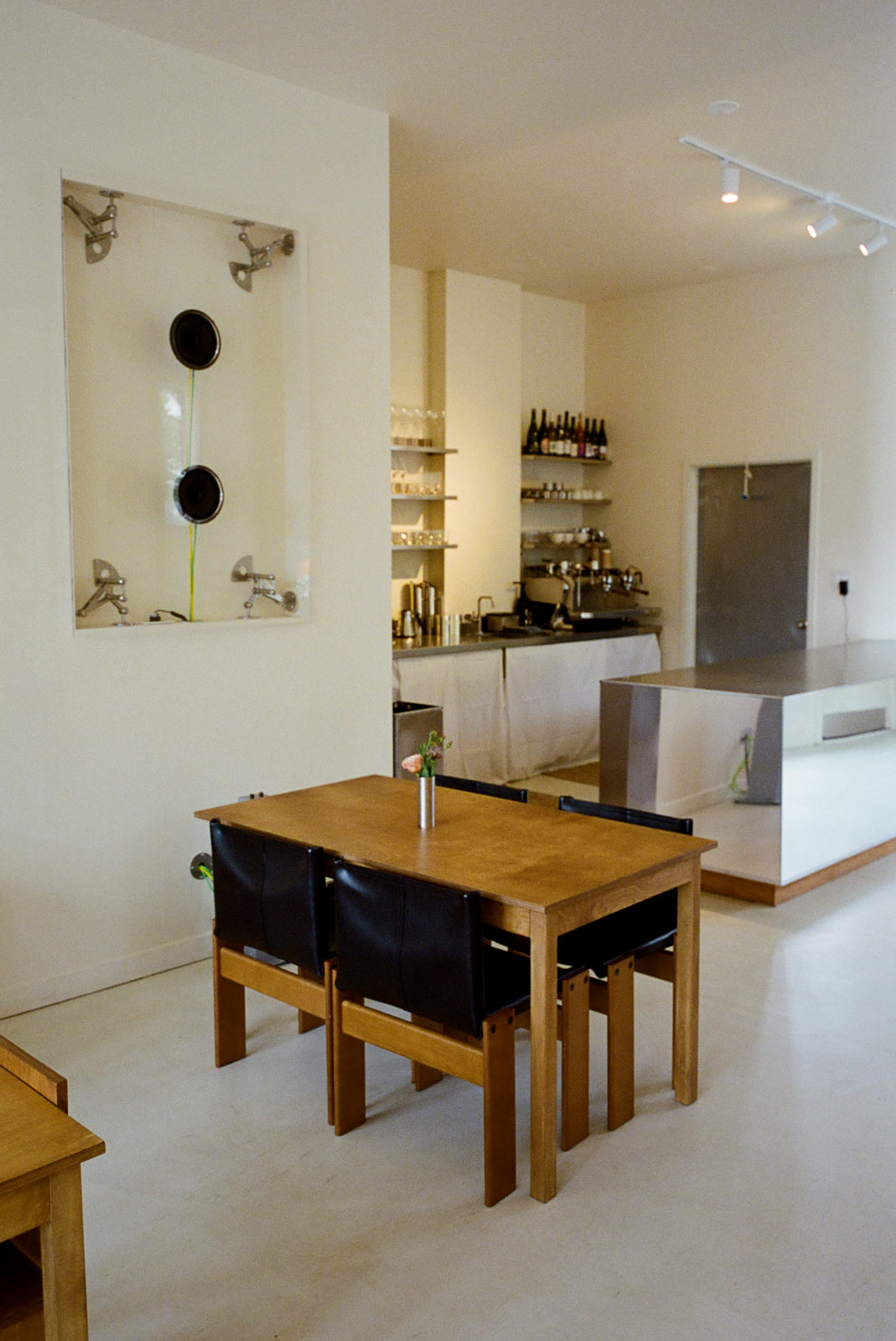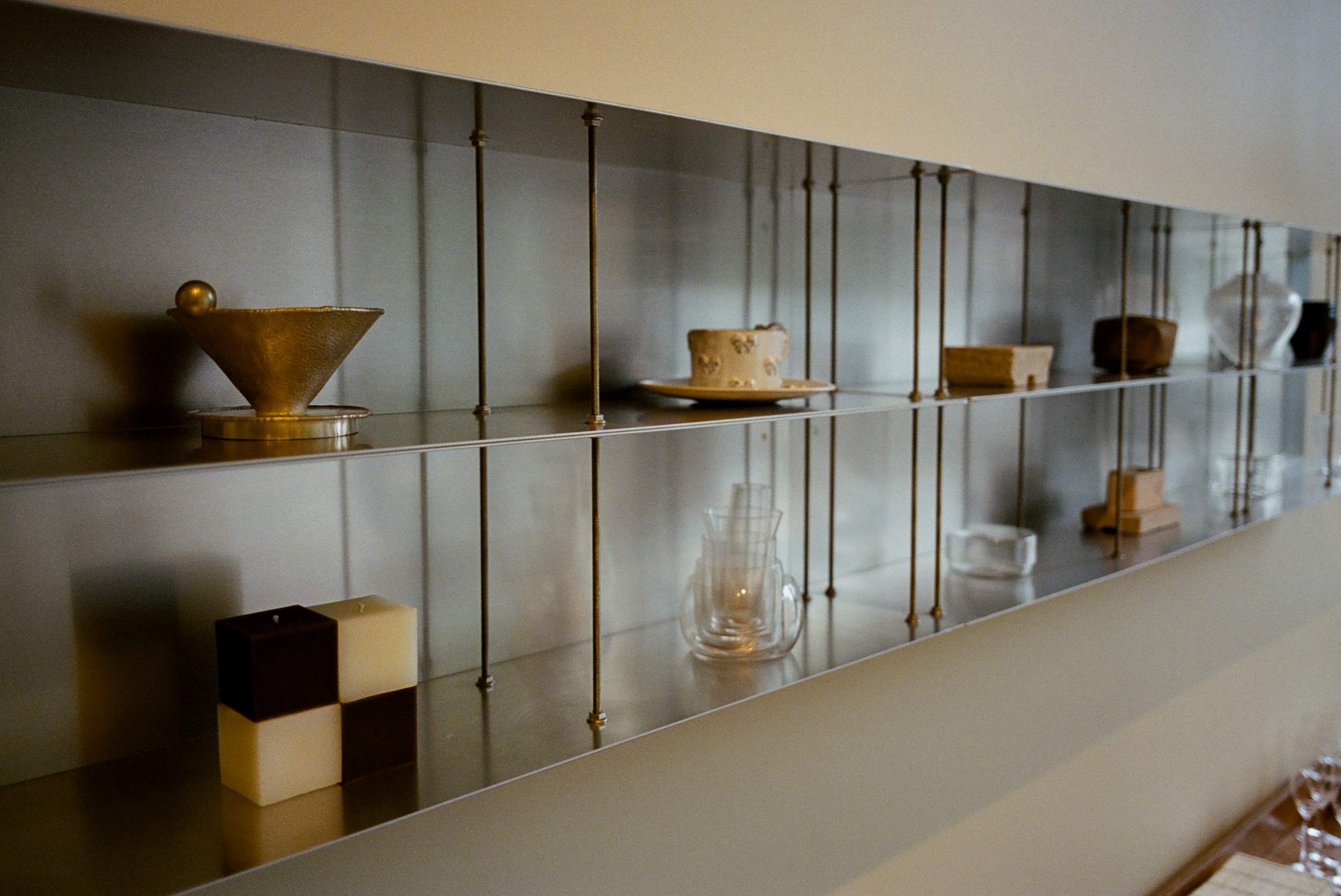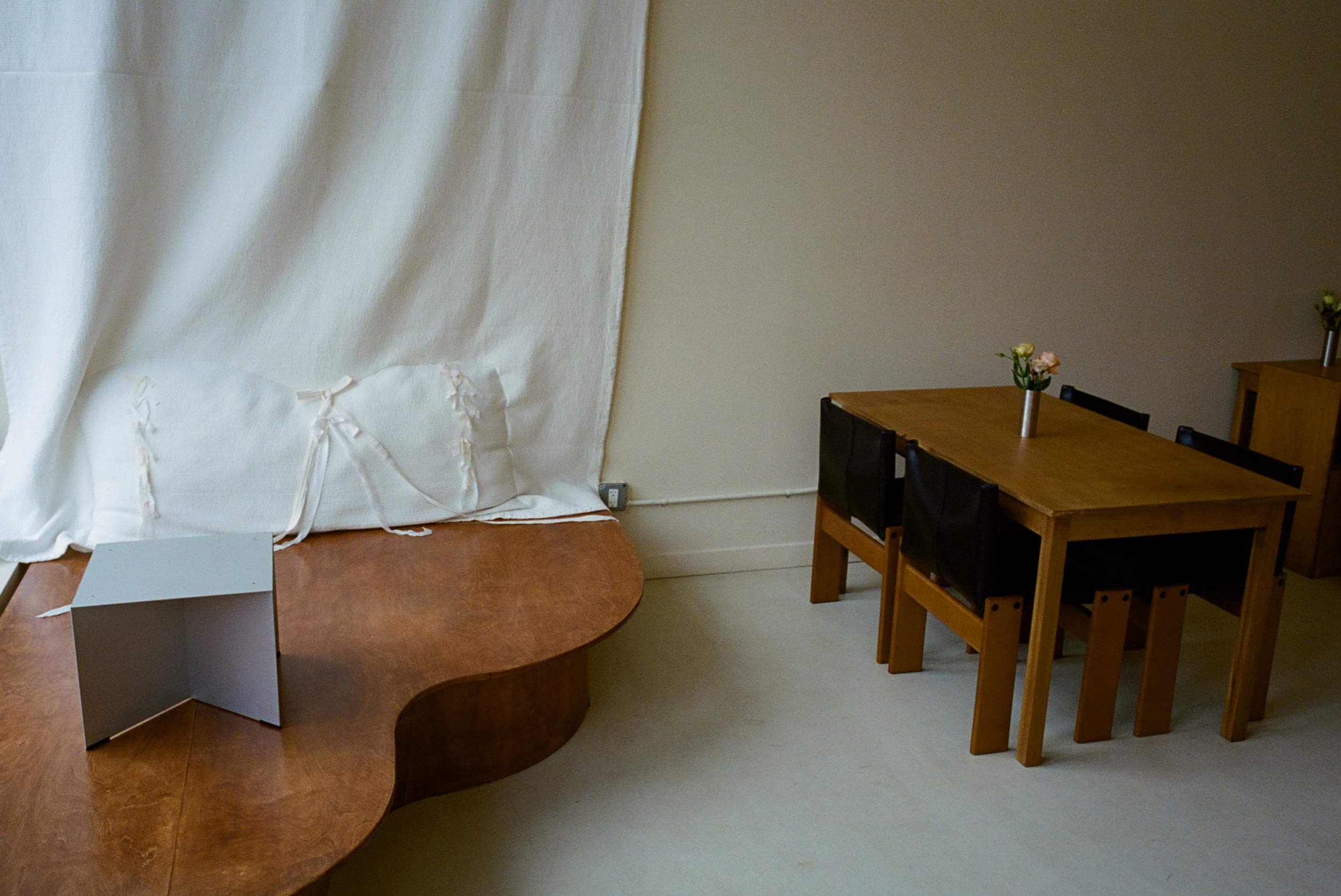Document has a latte with Suea and Carol Song, the fashion-savvy founders of Cobble Hill’s coolest shop-restaurant-space
DAE is the coolest shop-restaurant-space you haven’t been to yet. The newly-opened spot in Cobble Hill is an airy confection created by best friends and longtime collaborators Suea—an Instagram whiz perfectly situated at the intersection of food and fashion, with her impossibly delicious-looking cake delivery service and simultaneous work with brands like Nike and Cecilie Bahnson—and Carol Song, former Fashion Director of Opening Ceremony.
In the bio of DAE’s Instagram is a challenge: “Come experience.” So I stopped by to ogle the home goods, try their frothy Misugaru latte, learn about the omnipresent disease of cuteness, and perhaps most importantly, understand why DAE is not a café.
Nicolaia Rips: That’s so insanely delicious.
Suea: I love it, obviously. That’s why [the Misugaru latte] is on the menu. They’re such old-school ingredients. I think, in the last few years, there’s been an uptick with younger audiences in Korea exploring and playing with these ingredients—but definitely, to us, it’s something new. We’ve been kind of shocked, honestly, by the response to these drinks. A lot of Koreans have been like, ‘I missed this flavor so much.’ We just don’t want our retail story to get lost in any way. We’ve been open for just under a month, which is a long enough period for us to gauge what’s working, what’s not, and how we want to gear our audience towards the things that we’re excited about.
Nicolaia: I want to hear about what you’re excited about. But first, how did you two meet?
Suea: I was Carol’s assistant at Opening Ceremony. I got my first real job as an assistant buyer for womenswear there. Carol was, like, my boss’s boss’s boss’s boss. It was a very small team—like three people on womenswear. Carol oversaw the whole buying department. After a year or so, she was like, ‘Maybe you can be on my team directly.’ I didn’t love buying, the whole numbers aspect of it. I thought it was all glitz and glamor when I started, picking out cute clothes for the store—its so much more than that. But Carol’s world was so creative and fascinating. I eventually moved to the brand-editorial side, then Carol had a baby and left. I stayed, and was like, Oh, I’m gonna be Carol one day. But then Opening Ceremony closed and I was super over fashion. That’s when I pivoted to food.
Carol [and I] kept in touch that whole time: We really connected through our love for building a home [through] food, and would always share recipes and ingredients and get things for each other at specialty grocery stores. I had another corporate job at the time and Carol was thinking about what she wanted to do next, because her daughter was going to school. So that’s how DAE came about.
Nicolaia: Talk to me about the retail element of DAE.
Suea: There’s so much in Korea that you can’t get in the US—every Korean American knows. It’s not rocket science. Even Opening Ceremony was founded on the principle of sharing the rest of the world with New York. But with home goods particularly, we felt like there was this whole new generation of younger artists that were playing with traditional Korean craftsmanship, like ceramics, and newer things like glassware, which isn’t what Korean art back in the day was really known for. We were like, Maybe this could be a thing? I also think, after the pandemic, my younger friends who are in our late-20s, early-30s, were like, ‘Whoa, let’s make our homes cute.’ When we were living in Bushwick, we didn’t care—but now we’re investing in these nicer brownstone rentals, and everyone was spending so much time at home. We went to Korea together and sourced everything. Our vendors and designers are mostly Koreans, at least right now.
Carol Song: It’s just what we gravitate towards at that moment. This is our moment right now. If we went to Japan next, it’d be a different look. These are our homes, like right now: Right now, [DAE] is Korea-focused. But that’s not the primary intention, it’s just to grow with the things we love. Everything we pick, from the items to the paint color [on the walls] to the cups, that’s how we’re going to choose the whole thing forever. That’s the goal—to keep that focus, to keep the passion going.
Suea: I’ve been working in food the last few years, and I feel confident in my knowledge of that world. And Carol worked in fashion for 10-plus years; she could do the retail part of DAE with her eyes closed! But we’ve also learned so much. Home goods is a whole new market. People who work in fashion all know: There’s such a strict calendar when goods are delivered. We learned quickly, our artisans are very into their craft.
Carol: It’s almost like tailoring. There’s no seasons, but everything is defined by material. They’re just making everything one-of-a-kind. So they don’t have factories, they don’t have huge production. That’s not important to us. We’re not trying to be volume makers, we’re just trying to get things that are super special.
Nicolaia: How’s creating your menu?
Carol: We do it together. That’s when we have the most fun. I think that’s also why we don’t want to call ourselves a Korean café, because there’s a lot [on the menu that is] inspired by other cuisines from other places. Fusion is a nightmare word for us; we are not trying to be known for that.
Carol: If anything, it’s… touches.
Suea: When people ask if this is a Korean café, Carol’s always like, ‘No, we’re just both Korean. So, there’s a Korean touch on things.’ We love being Korean, and we have so much pride and joy in our heritage and culture. Obviously, anyone who comes to DAE can recognize that we have a deep appreciation for our roots. But it was very clear for us from the beginning that that’s not what we wanted. We have things on the menu that aren’t Korean at all: olives and salami and cheese. But we also have Korean rice bowls and seaweed and ideas that stem from Korean cuisine. I think people without culture, or without that deep sense of heritage, don’t understand fully. But people of color almost always understand immediately. We’re both immigrants and we grew up in America. So we’re not fully Korean, but we’re not fully American.
Carol: We grew up eating Korean food every single day of our lives from birth. How can we not incorporate that? That’s our palate.
Suea: Our menu is very seasonal and local. We go through our vendors and we’re like, Wow, they have crazy king crab. We never thought we were gonna do crab, but let’s, because it’s in stock. We want to be sustainable and limit as much food waste as we can. People who are here consistently will see the same ingredients pop up, because we’re trying to get rid of them. We bought a lot of anchovies the first week.
Carol: We must have done 10 different dishes with anchovies!
Suea: We did anchovy toast, anchovy dip, anchovy dressing… We get sick of things very fast. People come back begging for something that they saw on Instagram, and we’re like, We’re so over that. Like, that’s so two weeks ago. Even with our retail selection, we’re like, We’ve been looking at this stuff for almost a year now, let’s get new stuff soon. But we just opened. People just discovered it!
Nicolaia: I know you have aprons designed by Helena Manzano…
Carol: That’s a big part of what’s to come. We’re trying to debut those in a big way—sneak peek. Basically, we want to somehow merge home and fashion in a way that’s not been done before. I think Helena is a great example of what we’re trying to do. We approached her to do a cute home good [that] we can use for the café, and then maybe we can sell it one day. I think a lot of people are just exhausted with fashion—the politics, and the financial part of it is really crushing everyone’s spirits. I think the designers we’ve talked to felt like, Wow, this is something that I would love to explore.
Suea: We want to design our own stuff, too. We have so much energy! But it’s been a lot of day-to-day operations here—the last few weeks have been so crazy.
Carol: We wouldn’t have been able to do this interview.
Suea: But now we finally got a dishwasher. We’re very excited about that.
Nicolaia: Congratulations! Would you ever incorporate your cake delivery service into DAE?
Carol: I want her to.
Suea: I have no interest. I just want people to know that DAE… is not a fucking café. Like, we’re not. People get so pissed when we say no laptop. And we’re like, Whoa. We’re not a café. I do think it could be cute to collaborate with Carol on cake ideas. We’re trying to build out our events program. If someone has a crazy birthday party here…
Nicolaia: How does creating food for a brick-and-mortar space differ from creating food to post?
Suea: I think our worst nightmare is being known as an Instagram spot, but I’m also a very realistic person. It’s been crazy seeing how big of an impact social media has on a business. I’m not that surprised, because I myself have been making a living off of Instagram for the last few years. Now that we have a brick-and-mortar business, seeing [how] the foot traffic relates to how much and how often we post has been alarming. I think at one point, Carol was like, Oh, should we just not do Instagram before we open? I was like, No, there’s no way. I don’t care about any other platform. But I’m an old-school Instagram girl.
Again, it’s this weird thing where we want to tread lightly. We don’t want to be known as an Instagram restaurant, but we also can’t help ourselves with the cuteness. Everyone’s like, Oh, then just don’t be so cute. But we can’t! It’s a disease. We can’t not put our logo on something. Carol just perfected our espresso martini, and it would be so cute if we put our logo with cocoa powder on it. We’ve been branding orange peels for some of our cocktails, and obviously, people freak out. They love taking pictures—which we love, too. It’s an honor when people are into something you’re proud of, but there’s also a dark side to it. I think any business owner can speak on how hype is not the best. Korea has a really serious problem with this. Places are so trendy when they first open, and then they really, really die. Korea, as a society, is very trend-focused and trend-driven. We don’t want to be like that.
Carol: I think our ideal customer is a person coming in and shopping, and then they sit and drink a glass of wine or [have] a cocktail, and admire the things that we did. Then maybe we can sit and talk with them about the store. We want to be a neighborhood spot—not calling out people’s names for their coffee.
Suea: But when it gets crazy, we have no other choice—we feel like a Starbucks. At the end of the day, people gravitate towards the stuff you’ve put energy towards. That’s a lesson we learned. We have to trust the process.

















